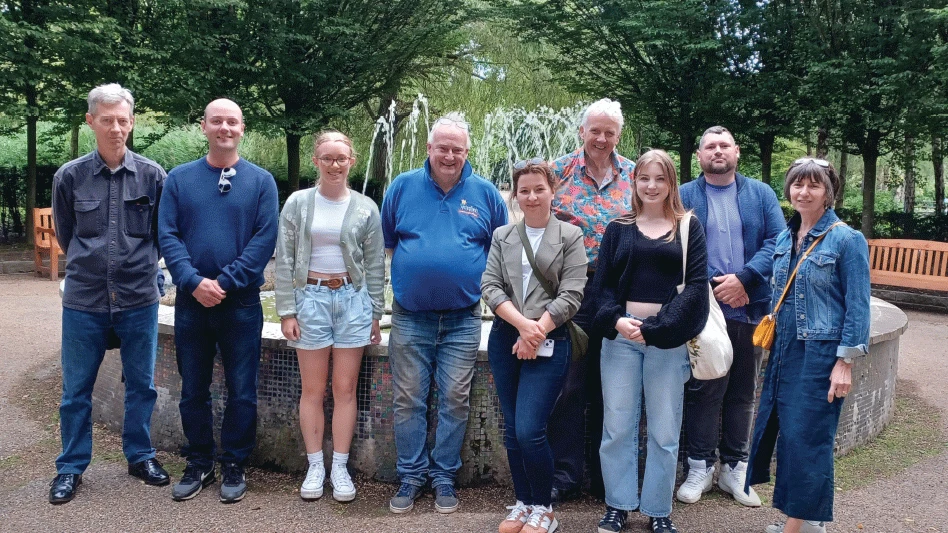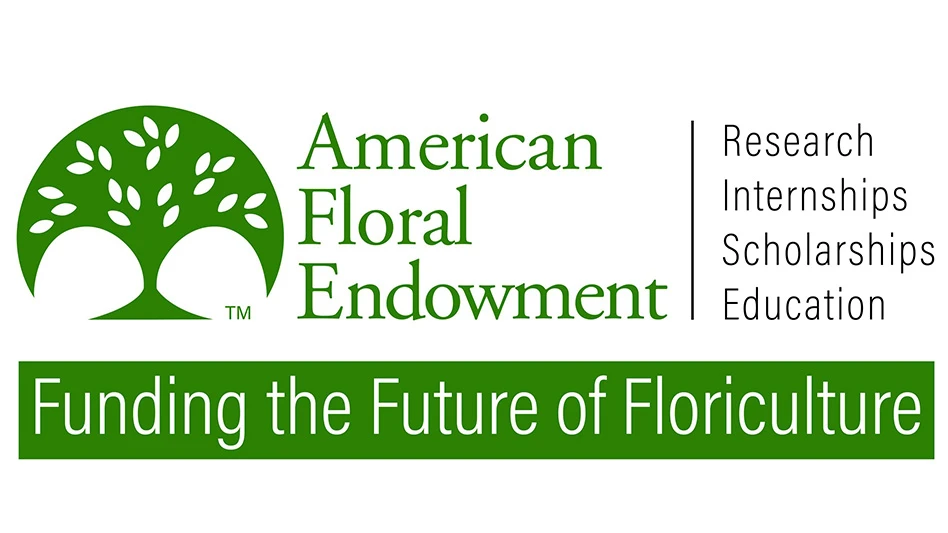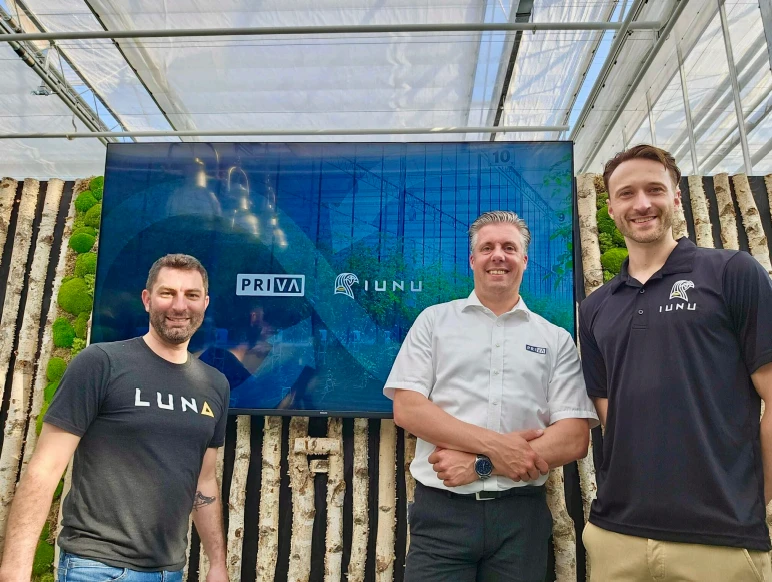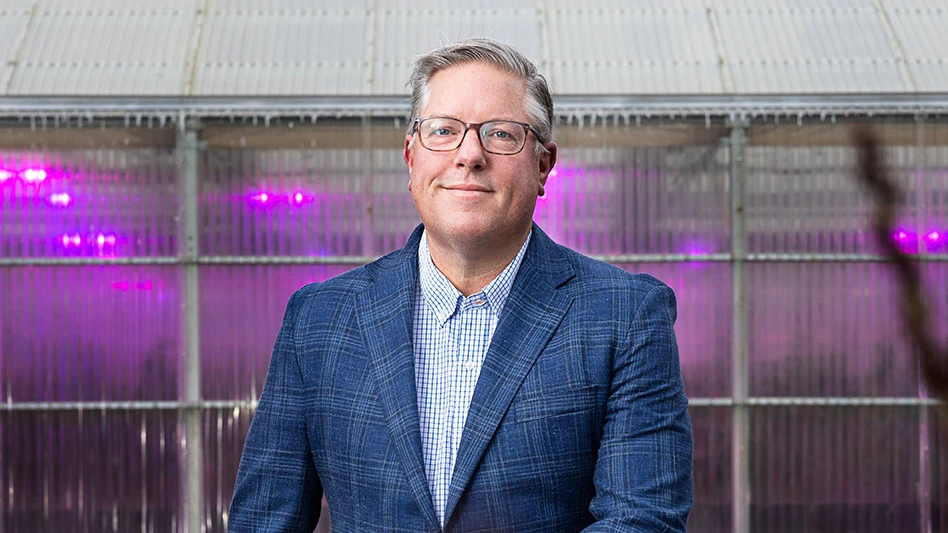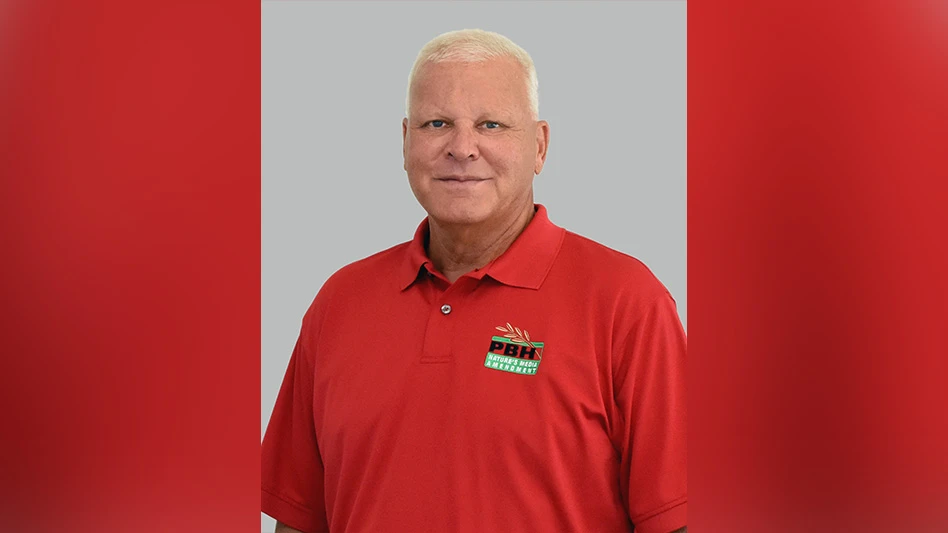
It’s a story that begins in a small town in Iowa in the summer of 1980. Two young, passionate horticulturists had just graduated college, gotten married, and moved back to the town of Cresco, Iowa, and were looking to take the next step in their professional lives—buy a greenhouse operation. Mike, alongside his new wife, Rachel, caught wind of a greenhouse for sale about 90 miles away, and brought the deal back to Cresco to discuss with the owner of Cresco Greenhouses, Arnie Kubalsky. The answer that Mike received when he asked if it was a good deal wasn’t what he expected: “I’m 61 and a half. You are my exit strategy.” About a week later, Mike and Rachel Gooder were the new owners of Cresco Greenhouses, which became Plantpeddler, a name that Mike came up with back in college. And so began the start of what has become a very successful career for Mike Gooder.
A milk carton, a seed and some soil
Mike was nudged into horticulture by many small events, the first of which happened during his first year of school, when he planted a French marigold seed in a milk carton. “I remember planting that seed, watching it grow,” he says. “I was lucky enough I planted it on the corner of the house and it got well-watered with [our] bulldog’s slobber. I remember that fall, that marigold was huge and at that moment I think I was hooked. And to this day we donate lots of products to schools for that very reason — to touch a kid. I think it’s instrumental for our future.”
As a teenager, Mike became involved with the FFA and managed the new high school greenhouse and entered FFA competitions. Up until that point, his goal had been to become a Department of Natural Resources officer and go into wildlife biology, but the greenhouse experience proved very influential.
During his time at Iowa State University, he met Rachel in a turf grass course. Rachel, an avid golfer, frequently missed their Friday classes for her tournaments, and she asked Mike to take notes for her. One summer, they worked at a golf course together because that was one of Rachel’s goals. However, that was all the time it took to decide their professional path should not end at the golf course, but at a greenhouse operation. Just after graduation and only about a week after getting married, they got the keys to what would become Plantpeddler.
Plantpeddler started out with a small retail location, and soon added another store, and more greenhouse space to support them. The extra space enabled them to add a wholesale division, which is 98 percent of their business today.
A green partnership
For many couples, it’s difficult to imagine both living and working with your spouse. However, Mike says, “Rachel and I haven’t known anything different,” and that it has worked out well for them. He and Rachel have distinct roles in the business based on their individual strengths and goals. Mike is on the sales and marketing side, while Rachel is in production, spending most of her time out in the greenhouse.
“We’ve had our issues,” Rachel says. “Every couple does. But we pretty much agree with the day-to-day operations and agree with what are the things we want to do. It’s easier for us to express our opinion to each other because he’s not my boss — he’s my partner. If we’re planning on expanding or we’re planning on adding different crops, it’s easier for us to talk about it because I’m going to tell him the truth and he’s going to tell me the truth. Because I can’t go home and gripe about my boss because I’d be griping to him.”
The strength of this partnership has played an important role in Plantpeddler’s success. “He and Rachel are like peanut butter and jelly,” Jeff Warschauer, vice president of Nexus Greenhouse Systems, says. “They are a team. Absolutely a team.”
The Gooders’ son, John, has been working at the greenhouse for the past three years since he graduated from Iowa State University with degrees in greenhouse management and horticulture, and a minor in ag entrepreneurial studies. “They’re both hands-on as owners,” John says. “They’re both not afraid to work their tail off. Where dad is more of the face of the company, mom’s been kind of behind the scenes, making sure that it’s doing what it’s supposed to be doing and getting us to where we’re going.” While he’s excited to one day take over the business, John says his parents will leave big shoes to fill.

It’s not work
Mike Gooder’s passion is horticulture, and it drives him to lead Plantpeddler to be the best it can be. “I think the thing that sums it up easiest, and I’ve heard this from my wife and kids, is I don’t think it’s work,” he says. “Sure, there are days where you get a little stressed, but I’ve never had a day in my life that I can recall that I got up and dreaded going to the greenhouse. I find it very motivating. I enjoy the constant challenge of managing the business — managing the crop mix, managing the customer, managing the financial side.”
Mike’s energy and drive to continually improve Plantpeddler is something that Rachel sees every day. “Mike lives and breathes horticulture and is passionate about the business,” she says. “He never stands still. He’s always looking to the future and how to progress with our business.”
“He really is in it for the love of the game,” says Christopher Currey, assistant professor of horticulture at Iowa State University. “The guy loves plants, he loves being a greenhouse grower, he loves his wife, kids, family business and northeastern Iowa. Whatever Mike does, he does it with passion and enthusiasm.”
“When spending time with Mike, his passion for both horticulture and business is obvious,” says Jeffrey Boeke, a lifelong friend of Mike’s. “To put it simply, he lives and breathes it.”
Warschauer relates Mike ’s relationship with horticulture to a marriage. “The difference with Mike is that every day [his career is] a new marriage for him,” he says. “It’s past the handholding and the first kiss. He’s so passionate about what he does. [There’s] that old saying, that if you don’t really love what you do, you may do okay with it, but you’re not going to be the best in the business. You have to wake up every day with excitement.”
Supporting the horticulture community
Mike’s love of horticulture fuels a drive to ensure the future success of the horticulture industry, not just Plantpeddler’s. Stemming from his early FFA experience, he continues to support the organization and its local chapters, and believes the industry’s labor force issues could be eased by supporting FFA.
“The FFA of today has its largest membership ever,” Mike says. “That’s a big audience for us. Labor is the biggest problem, yet we have a pool of people that are in FFA. We need to be instrumental as an industry and help elevate horticulture as being a good career path for people, explain and tell that story to kids, especially in FFA because they have an ag interest. Hopefully, down the road [it will] appease some of our leadership and management situations that we’re faced with within the business.”
ISU, the Gooders’ alma mater, has also benefited greatly from Mike’s generosity. “[Mike] unequivocally offered support to my research project at Iowa State just because he wants to see the ISU Department of Horticulture do well,” Christopher says. Not only has Mike donated plant material for Christopher’s research and helped him promote ISU programs, but Mike is invested in the future of horticulture, Christopher says. “I hear him voicing concerns and asking questions about the greater industry and not just Plantpeddler and his bottom line,” Christopher says. “‘Where is the next generation of growers?’ [Mike asks], not just the growers of Cresco, Iowa. [He wants to know] how we get more students interested in majoring in horticulture and beyond that, specializing in greenhouse crop production.”

In the years that Warschauer has known Mike, he’s also known him to be very aware of what’s going on around him. “He’s a very strong community person,” he says.
Mike is an active participant in industry groups and events, as well as being involved with local events, and ISU for the past 15 years. “Most recently, I really enjoyed my time with AmericanHort,” he says. “I had been a member of the OFA, back when it was still the OFA, since high school. Locally, I’ve been involved in events [like] AgFest, I’ve been president of the Cresco Chamber of Commerce and [have done] a lot of public speaking, both in and outside of horticulture.” He also runs Plantpeddler’s Variety Day, which showcases their trial gardens and provides educational lectures by plant breeders and industry experts, such as Mike.
How to be a star plantpeddler
Leading a successful young plant company is no exact science, but fortunately Mike has the drive and personality to serve as a strong leader and support his employees without micromanaging. “I’m pretty laid back in my management style and I let key people in the company run it,” Mike says. “I’m the guy at the top that helps steer and give direction.” And some of Plantpeddler’s employees have been with them since the beginning. Now that his children are older, Mike is enjoying being on the road more again. He says his greatest satisfaction is that the place runs best when he’s gone, because that means he’s done a good job leading the company so far.
One of Mike’s leadership philosophies is: “Never limit yourself by knowing where the edges of the box are.” It’s a nod to his desire to keep improving the company, even when the changes might be expensive, unfamiliar or risky. Plantpeddler has grown almost every major ornamental crop, but “we have failed” at just about all of them, Mike says. “But as I tell my staff, in baseball if you have a winning record, it might be 51-49, but you still won,” he says. “You’re not going to make all good decisions; you’re going to make bad decisions along the way. But as long as we learn from every one of those mistakes, it will drive us to our goals.”
Another sports-themed guiding principle came from Plantpeddler’s CPA, Joan Leuenberger, when she came in for her first interview. “One of the first lines that she told me is, ‘Mike, you can only have so many players on the team; you’ve got to have the best players,’” he recalls. “I think about that all the time.”
Mike’s vivacious, curious, generous and detail-oriented personality and ability to relate to employees and industry colleagues have contributed greatly to his success and leadership, according to friends and colleagues. “Mike has a wide-ranging and forward-thinking mind,” Christopher says. “He’s got a lot of perspective.”
“What really sets Mike apart from many, however, is his understanding and appreciation for people,” Boeke says. “For Mike, horticulture is about people, not plants. For Mike, successful business is about people, not money. Not forgetting where you came from and who influenced you as well as who continues to support you is the golden ticket for a successful business and a successful life. Mike inherently knows this and those relationships define who he is, who he wants to be, and who he will become. This is what sets him apart from many in the corporate world.”
Mike’s collaborative, “go-getter” attitude is what Rachel sees. “Mike speaks his mind,” Rachel says. “If the industry is in trouble, he says, ‘let’s fix it.’ He doesn’t sit on his hands and let somebody else do it.”
John considers his father to be one of his mentors. “It amazes me every day where his mind goes,” he says. “It’s always onto the next level of Plantpeddler. It’s not just status quo.”

“Mike is always concerned about the other person more than he is himself,” Warschauer says. “Once a partner, once a friend of Mike’s, whether you’re a supplier, family, the guy across the street — you’re in for life. He’s there for you and would give you the shirt off his back.”
Learning from other leaders
The biggest influence on Mike’s leadership has been his father. “He started many successful businesses with no fear of failure his entire life,” Mike says. “Watching his example of leadership and his entrepreneurial element is definitely one of the things that’s given me a lot of confidence. I often think about a lot of the things that he taught me.”
While his father was an important role model, Mike also took lessons from others in his life. “I’ve been blessed by a number of people that have been very influential and good role models,” he says. Among them, he lists his uncle on his dad’s side; his best friend Jeffrey Boeke’s father, a pharmacist who taught him about “the social side, conversation and the outdoors;” and the previous owners of Cresco Greenhouses, Arnie and Pauline Kubalsky, and their children, who helped them through the transition and wanted to “be a part of our success,” rather than simply walking away after the sale. Mike also mentions Norm White, a pillar of the industry. “Norm White has [always] been one of my role models,” he says. In general, he’s tried to emulate the success of his mentors over the years.
Guiding Plantpeddler through troubled waters
Plantpeddler has undergone many necessary transitions to stay relevant and make it through challenging economic times. At one point in the 1990s, Mike “saw the writing on the wall” about big box stores putting smaller stores out of business, and knew that Plantpeddler had to shift its focus in order to survive. Mike decided that, instead of using the money they set aside for a new greenhouse, they would hire a consulting firm to guide them into the future. “We invested about $350,000 during that two-year period in a project called PP2000 that led us to identify opportunities,” Mike says. “The problem was that nobody in the U.S. was shipping a good begonia liner that matched the European level of quality. We went to Europe. We learned how to do begonias the right way. The change that came out of the box stores getting into the florist business and driving small florists and grocery out of the industry allowed us to see an opportunity to get into a crop and product that’s one of our mainstays today.”
“Adapting the company and its people to growth and change is probably the most dynamic and interesting part,” Mike says. “Change is a powerful word. There are a lot of people that fear the word ‘change,’ and you’d better be careful how you approach change because change means insecurity to a lot of people. If you’re going to survive change you need to make sure you have buy-in from your key players. That’s the one part where we’ve exceled is making sure everybody knew the reason for the change, hopefully what point that was going to take us to, and what the goal was after the change had happened.”
The Great Recession of the late 2000s was as much of a challenge for Plantpeddler as it was for other businesses. “We got bounced around between banks,” Mike says. But he wasn’t ready to give up quite yet. “Probably most people would’ve said at this point ‘Forget it, throw it in — it’s not worth it,’” he says. “But with a never-fail attitude, there’s always a way to get the job done.” Plantpeddler, under Mike’s leadership, pushed through, and the company is stronger now than ever.
Rachel says that economic crises aren’t the only ones that have affected Plantpeddler over the years, and that Mike has handled all of them well. “He’s pretty levelheaded,” she says. “We’ve had so many ups and downs. We got hit by a tornado twice; we’ve had a fire and other emergencies. And [his response is] ‘It happened—now what are we going to do to fix it?’ That’s been Mike all of his life.”
“I’m at my best when we’re at our worst,” Mike says. “Everything is going along fine, the greenhouse looks really good, and all of a sudden you get spanked by a Midwestern storm. Glass is blown out all over, crops are all messed up. You’ve still got to take the business and put it back on its feet and get back in operation within hours.”

Boeke says that Mike’s resilience is due in part to his desire to keeping growing, professionally and personally, even when the situation is less than ideal. “A continual pursuit for growth of knowledge, growth of business, and obviously the growth of plants is what motivates him,” Boeke says. “There have been times when things didn’t work too well and other times when they did. Regardless of the outcomes, the race continues for Mike, exemplifying a ‘pick yourself up and get busy’ mentality.”
Building a legacy
Being able to pass on a strong, viable greenhouse business is of paramount importance to Mike, who is a dedicated family man. “I think the most important thing is to build a legacy that I can pass to our children and to the people that have helped build the company,” he says. “One of the unique features of our industry is you can have a family-owned business and have multiple generations.”
His children, Abby and John, grew up around the business. Upon graduating from ISU three years ago, John decided to learn from his parents before they decided to step down. “I realized that if I was going to go back to Plantpeddler, I was going to have to learn the ropes from some of the most knowledgeable and the hardest working people I knew — my parents,” he says. “There was no better place for knowledge than from the people who got Plantpeddler where it is today.”
It’s been a “privilege” to grow up in the greenhouse and watch it grow along with him, John says, and a great opportunity to work with and learn from his father. “I’ve worked with him every day and grown up with the guy,” John says. “I’ve been fortunate that I’ve seen all angles of him and not just as a son but as an employee. And it’s been a fun situation I find myself in. I wouldn’t change it at all.”
However, John says that he’s had to work just as hard as everyone else to prove himself within the company. “I can’t say there’s any favoritism toward me as their kid since I’ve been back full-time with the company,” he says. “It’s more of a formal deal on that side. But it’s nice because you can tell them your thoughts and know that they’re actually listening — not just because you’re their kid, but also because you’re an employee and work next to them. And you work just as hard as they have over the years. It’s an interesting relationship to juggle because usually family dinners turn into business discussions.”
And those family dinners turned business dinners helped shape the Gooder children’s perspectives on the business, Mike says. “It’s made the kids very aware of the challenges of the business,” he says. “Failures and successes, they’ve lived them, they’ve heard us talk through them.” But as a family, they were also a “work hard/play hard bunch,” he says. Whether it was a boating trip on the Mississippi River or a trip to see an Iowa State football game, horticulture would inevitably sneak in in the form of a visit to a garden or a greenhouse.
Mike hopes that his children see him as a leader, but also as a human. “We all have our weak spots and our flaws, not unlike anyone,” Mike says. “I hope they see through that side and see a person that’s passionate about business, passionate about the people that have helped build the company, and extremely passionate for our customers and their success.”
Mike has done his best to lead by example, and hopes that his children have seen that in order to be successful, you have to be passionate. “You have to believe in what you’re doing and put all of yourself into it,” Mike says.
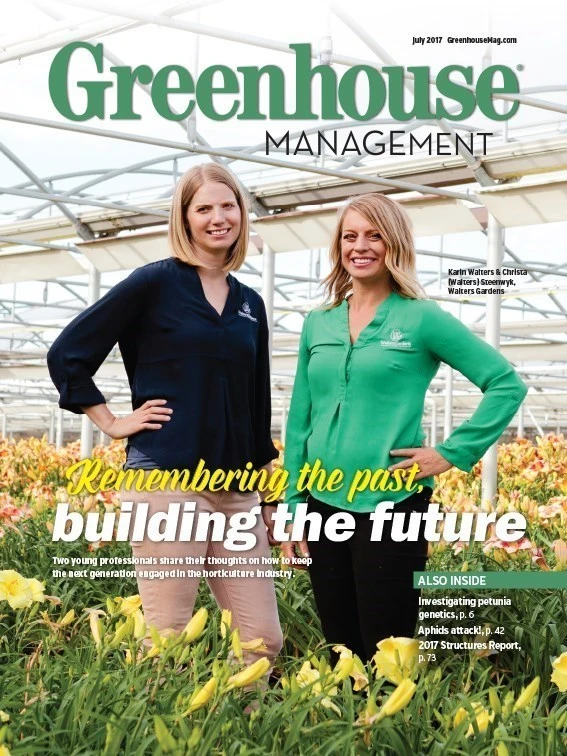
Explore the July 2017 Issue
Check out more from this issue and find your next story to read.
Latest from Greenhouse Management
- Oglesby Plants International announces Shane Pangle as sales and marketing director and honors retiring sales manager Ginger Goff
- The National Association of State Departments of Agriculture sets 2026 federal policy focus
- Maryland’s horticulture industry grows to $1.76 billion
- Grow your own way
- Nurturing natural skills
- The Growth Industry Episode 9: IPPS International Tour preview with Brie Arthur and Liz Erickson
- Help us honor the industry's best
- University of Florida study unlocks secrets of invasive short-spined thrips
